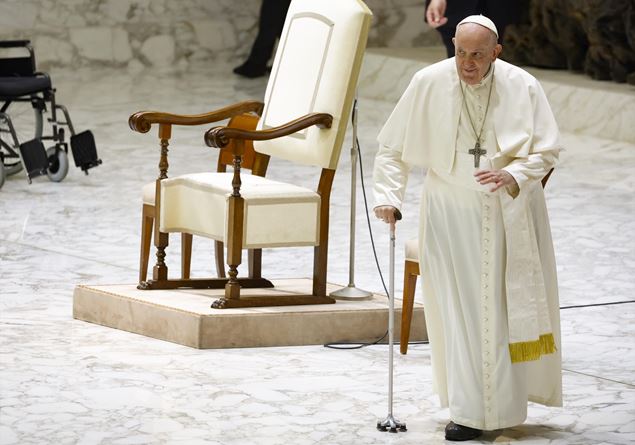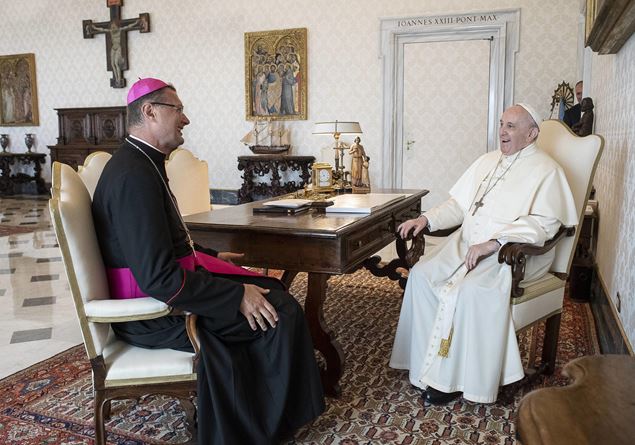On February 24, the third anniversary of the War Intimation, a day of prayer was declared for all of Ukraine. To decree it was the Ukrainian Parliament, on the proposal of the various churches and religious confessions of the country. Reminds him Monsignor Visvaldas Kulbokasapostolic nuncio in Ukraine, which reflects on these three years of war and on the historical moment that Ukraine is experiencing, in light of the role of faith and the Church.
“At this moment three challenges can be identified for the Church,” explains Nunzio. “The first is linked to the Jubilee and is the theme of hope. I think in particular of the many civil prisoners: they often have no hope, Because the exchanges for this type of prisoners do not take place, given that Ukraine has no Russian civil prisoners; Furthermore, Russia often considers these prisoners as its citizens. Therefore, international mechanisms are also missing to help them. Neither the red cross nor the Holy See have the right to do something for them. A 60 -year -old Ukrainian lady, Lyudmila, who spent three years in captivity, told me some time ago: “I had done nothing so at the beginning I was convinced that the Russians would freed me immediately. Instead I was prisoner for three years. One of the difficulties I faced was to be deprived of sleep. Then they began to make me sign reports and I didn’t understand anything anymore, what was reality and what fantasy ”. Let’s think about mothers whose children are in captivity: these women must be supported, helped. Who can intervene in favor of prisoners? What will it be of them? Who will think of their situation in the context of peace negotiations? The prayer then, for these people, becomes of fundamental importance. A similar situation is that of the soldiers at the front, as the military chaplains confirm us: to contact God, pray, hope for eternity is of great help, to be in peace with oneself, to face the war in a more human way. I am very grateful to the Pope for having launched the Jubilee of hope, which here in Ukraine today is a profound meaning ».
The second challenge of the Church is not to escape from reality: «When the Church lies in the midst of people it perceives the difficulties of war, the causes, what is implicated. This means not taking war superficially. When we pray for peace we turn to God wondering what concrete actions we can take us to seek the way of peace. We cannot be with our hands. In these three years the numbers of the war have always been growing, year by year: the number of military deaths, including civil ones. The conflict is not decreasing at all, it is growing. War is an attack on human life, it is the annihilation of all values, violation of borders and international law. AND If there is not a way of exit often the trend is to expand the conflict. Europe has been very solidarity with Ukraine, but is not directly involved in the war and when international law fails, Europe also remains discovered, defenseless, in a risk condition. Either the peace is restored on the basis of the principles and rules of international coexistence, or we all remain vulnerable, with the danger that the conflict can extend even more. When the Pope prays for peace by invoking the dialogue, he intends to dialogue among all, talking all of them together, taking on in our conscience the responsibility of seeking peace in all possible ways. But a true, concrete, lasting peace that is not used to violate coexistence and to lay the foundations for other wars. A peace that is not only political, which respects people’s lives, human dignity ».
The third challenge, concludes Monsignor Kulbokas, concerns dialogue: «The church is open to everyone, dialogues with everyone. But we must testify to him concretely. This means thatas believers, we must have more incisiveness in politics. When they talk about the warthose who govern prefers to discuss territories, economic costs, military issues, putting aside human life, people. If we believers no longer become incisive in political life, both nationally and internationally, we risk losing our points of reference ».
(Ansa photo: Monsignor Visvaldas Kulbokas, apostolic nuncio in Ukraine, in a meeting with Pope Francis in 2021)








